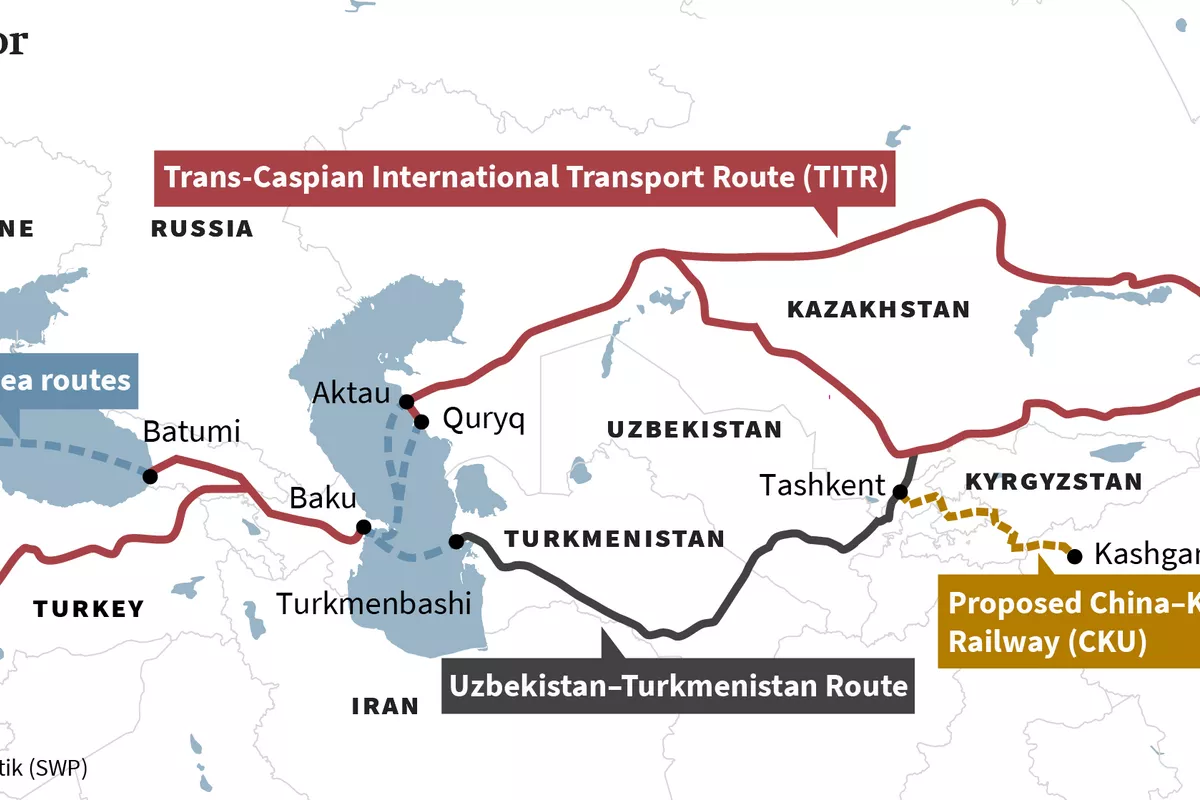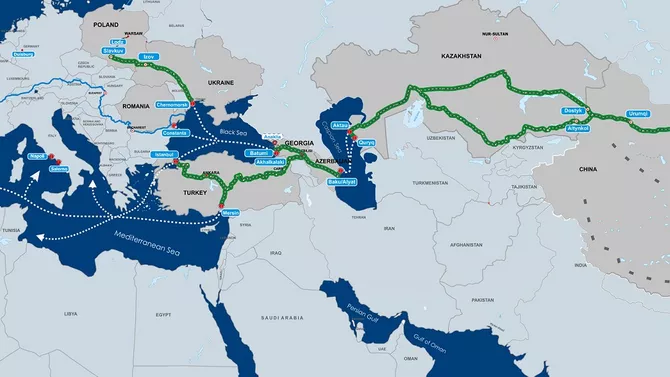
photo: Qafsam
By all indications, Europe’s interest in the Middle Corridor - the Trans-Caspian International Transport Route (TITR) - is gaining momentum. Long viewed as a logistical alternative to traditional East-West routes, the corridor is now emerging in policy discussions as a broader geopolitical and economic opportunity.
On July 2, the UK House of Lords hosted a timely event titled "The Middle Corridor: Strategic Investment and Cooperation Opportunities", organized by the parliamentary group Third World Solidarity. Speaking at the event, Kazakhstan’s Ambassador to the United Kingdom, Magzhan Ilyassov, stressed that the countries developing the corridor are not merely focused on transit - they aim to establish industrial cooperation and value-added production along the route. Kazakhstan, he emphasized, seeks to process raw materials, including rare earth metals, domestically and export finished products to Britain and beyond. The Middle Corridor, therefore, should not be seen as just a “transit line,” but rather as a vector for industrial development across Eurasia.
This message found strong echoes among other participants. Arzu Abbasova, an analyst at the Royal United Services Institute (RUSI), emphasized Azerbaijan’s role as a vital regional and global transport hub. Nick Coleman, Editor for Energy at S&P Global Commodity Insights, identified a strategic triangle - Azerbaijan, Kazakhstan, and Türkiye - as crucial for Europe’s energy security. Asylbek Nurgabdeshov of Edinburgh Business School added that the UK has a unique opportunity to support the corridor’s transformation into a catalyst for sustainable Eurasian trade.
In parallel, at a London conference on Caspian regional connectivity, UK Trade Envoy to Azerbaijan and Central Asia, Lord John Alderdice, called the corridor a source of “enormous economic benefits for the Euro-Caspian space.” He revealed that the UK Export Finance agency (UKEF) has already closed its first deal in Azerbaijan’s aviation sector and is evaluating infrastructure projects in Kazakhstan and Georgia, including ports and railways.

photo: Caucasus Watch
This growing British interest mirrors similar signals from Brussels. In March 2025, EU High Representative for Foreign Affairs Kaja Kallas called the TITR a vital component of regional connectivity in Central Asia, stressing the EU sees “many opportunities on both sides.” That sentiment was reaffirmed at the April CA-EU Summit, which formalized a strategic partnership and announced a €10 billion investment package for transport and logistics infrastructure across Central Asia.
Germany, too, appears increasingly engaged. During German President Frank-Walter Steinmeier’s visit to Baku in April, the Middle Corridor was a central theme in his talks with Azerbaijani President Ilham Aliyev.
Further momentum was generated at the GLOBSEC 2025 Forum in Prague, where Hikmet Hajiyev, Foreign Policy Advisor to the President of Azerbaijan, highlighted Baku and Astana’s joint effort to establish a high-speed internet connection across the Caspian Sea - a digital bridge linking the continent. He also noted Azerbaijan’s integrated transport infrastructure with Central Asia and ongoing work with China, Kyrgyzstan, and Uzbekistan on a new 900-kilometer railway shortcut across the region - a strategic component of the East-West vision. “What Azerbaijan needs from the EU,” Hajiyev stated pointedly, “is not assistance, but full-fledged cooperation and partnership.”
Concrete results continue to follow. On June 30, a new multimodal freight train connecting Beijing and Baku was launched as part of the China-Europe railway corridor. According to Haydar Abdikerimov, Secretary-General of the TITR Association, total cargo volumes across the Middle Corridor in 2025 are projected to reach 5.2 million tons (including road transport). To facilitate this growth, efforts are underway to minimize delays at border crossings and ports, while feeder vessel capacity on the Caspian may be expanded to 10 ships.
And Europe’s energy map is also being redrawn. The EU is reportedly exploring the viability of a major green energy transmission line across the Caspian Sea - a joint initiative of Azerbaijan, Kazakhstan, and Uzbekistan - that could one day deliver renewable electricity to European markets. In this light, Baku’s strategic role as a connector between East and West becomes even clearer.
The South Caucasus and Central Asia are no longer viewed in isolation. Increasingly, these regions are understood as part of a single geostrategic space - and at the heart of that new Eurasian vision lies the Middle Corridor.
Share on social media